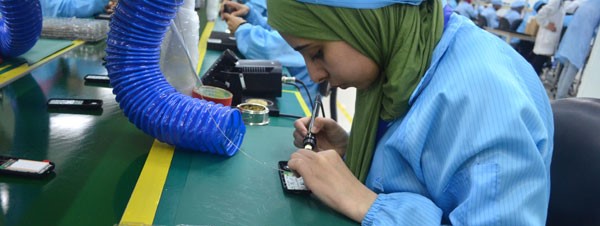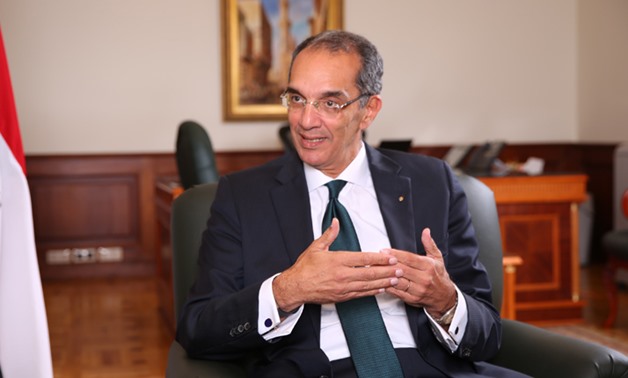The newest generation communications network will shape not only Africa’s long-term economic future but also political ties.
Marvel Studios’ “Black Panther” in 2018 took place in an African nation that was more technologically advanced than any other country. In the real world, the continent is poised to become more high-tech than most developed nations in the next few years.
The rapid adoption of mobile money transfers is a case in point. It first appeared in 2007 in Kenya, spreading to the world from there. A 2019 GSMA report titled “5G in Sub-Saharan Africa: Laying the Foundations” estimates that Africa accounts for nearly half of the world’s mobile money accounts, representing 62.1% of global transaction volume and 66.1% of value. Annual growth rates are still in double digits.
Today, another technological revolution is starting in the continent: 5G. South Africa and Kenya, the birthplace of mobile money, lead the way in deploying the fifth-generation technology standard for broadband cellular networks. In February, the Global Mobile Suppliers Association reported that “24 operators in 18 African countries are evaluating/testing/trialing/deploying 5G.”
The impact will be transformative. “While it takes 22 minutes to download a high-definition movie on a 4G network, it will take 32 seconds on a 5G network,” reported Yomi Kazeem of Quartz Africa in October. The new network’s capacity is 100 times more than a 4G network within a square kilometer, he added. That means opportunities, including real-time online interfaces with machines, known as the internet of things (IoT).
Opportunity Africa
 About 67% of Africa’s population was under the age of 30 in 2020, according to Statistica, making the continent the youngest in the world. With more than 900 million people growing up with smartphones and the internet, Africa’s sustainable and rapid adoption of existing and future technologies is virtually assured. “One of the most well-known characteristics of millennials is how comfortable they are with technology,” wrote Kaitlyn McAvoy, Landmarks Illinois communications manager, in a Spend Matters blog. “Their ability to use, apply and understand different technologies quickly sets them apart from other generations in the workforce,”
About 67% of Africa’s population was under the age of 30 in 2020, according to Statistica, making the continent the youngest in the world. With more than 900 million people growing up with smartphones and the internet, Africa’s sustainable and rapid adoption of existing and future technologies is virtually assured. “One of the most well-known characteristics of millennials is how comfortable they are with technology,” wrote Kaitlyn McAvoy, Landmarks Illinois communications manager, in a Spend Matters blog. “Their ability to use, apply and understand different technologies quickly sets them apart from other generations in the workforce,”
The GSMA report noted a significant shift from basic voice to data-centric services in Africa. “Smartphone adoption has doubled over the past three years,” wrote Kenechi Okeleke, senior manager at GSMA. He describes those users as a “generation of digital natives.” According to the report, 272 million Africans had smartphones in 2019; more than half of the “unique mobile phone subscribers” in the continent. That number is expected to be 475 million by 2025.
With 5G clusters already appearing worldwide, the latest technology will inevitably spread to most of Africa soon as a natural progression from 3G and 4G. Currently, 413 operators in 131 countries invest in 5G networks, from testing to commercial deployment.
Last year’s lockdowns emphasized the rise of online work, shopping and entertainment. “The increase in data traffic has been amplified by the COVID-19 pandemic,” Alpin Verlet, Nokia’s CEO for West and Central Africa, told The African Report in April. He estimated data consumption on his company’s network increased as much as 50% in Africa last year. Governments and telecom companies are quickly realizing the importance of expediting the development and testing of their 5G networks.
In the short term, the Finnish company’s African operation is developing “more tools based on artificial intelligence to automate the management of customer networks and predict future demand patterns,” said Verlet. The sustainable long-term solution is 5G, leading Nokia to enter tenders to lay infrastructure on the continent. In November, it won the contract for Togocom, Togo’s leading telecom provider. The 2Africa subsea optic fiber cable also is being extended to increase 4G network capacity and become the primary channel for 5G traffic to and from the continent.
Building the future
Much like 3G and 4G, 5G networks are starting in small clusters across Africa. “Every time you take a quantum leap to go to the next generation, it is only available to a limited number of people in the first few years,” Victor Stephanopoli, chief operations officer of MzansiSat, a telecom provider in South Africa, told Space in Africa. “When 4G was introduced, it initially rolled out in highly dense and wealthy metropolitan areas before it became ubiquitous a few years down the line. The same thing will happen with 5G.”
Even in areas fortunate enough to get the network, the “5G in Sub-Saharan Africa: Laying the Foundations” GMSA report says coverage will be limited to fiber-optic connections via 5G routers. Individuals with compatible smartphones won’t be able to use 5G SIM cards, “particularly in the early stages of network deployment and adoption,” noted the GSMA report.
As a result, governments, businesses, and mobile operators likely will be the first to benefit from 5G networks, a primary enabler of the fourth industrial revolution, said the report. It will also give AI and IoT more capabilities, helping businesses transform their processes to drive productivity and efficiency. To do so, however, companies would have to purchase the latest 5G-compatible machinery.
Government-led investments are critical to successful deployment and mass usage as they are often the “biggest enterprise, particularly in Africa,” wrote Okeleke of GSMA. The motivation driving that spending is that 5G networks allow the state to offer more services online without overloading the network. The new network’s added speed will also give the state real-time updates on transactions involving sensitive information, enabling them to spot breaches as they happen.
Benefits to African consumers will come much later, according to the GSMA report, because of 5G smartphones’ higher prices, with the vast majority of current applications not requiring significantly higher speeds. The report also noted that in its infancy, the service would be considerably more expensive than 4G. “Device subsidies will be crucial to 5G adoption in the consumer segment,” the GSMA paper noted. That includes 5G routers, augmented and virtual reality devices, and advanced household goods that use IoT technologies.
Some African governments also need to instill confidence among users. “When the … pandemic broke out in [South Africa, which has commercial 5G networks], the country had to quell rumors that there was a connection between the deadly virus and the proliferation of 5G,” reported journalist Admire Moyo for ITWeb in March. South Africa’s health minister Zweli Mkhize said at a press event: “We are dealing with a lot of fake news here. The reality is that 5G is a technology, and coronavirus is an organic infection. [It] is not something that you can link to any technology.” The country’s Council for Scientific and Industrial Research hosted an event “addressing the growing concerns that social media raised linking 5G networks to deteriorating human health.”
Laws and regulations will also be vital to deploy 5G networks successfully. “Governments and regulators need to consider market structures that foster a pro-investment and pro-innovation environment for the deployment of the 5G mobile ecosystem,” said the GSMA report. Those laws need to simplify approvals to build the network, ensure flexibility, grant spectrum access, and curb regulatory costs, the document said.
Leading the way
 So far, two African nations have launched their 5G networks. In the first half of 2020, South Africa’s MTN and Vodacom launched commercial 5G networks in Pretoria (the executive capital), Bloemfontein (the judicial capital), and Cape Town (the legislative capital). The high-speed network also is in Johannesburg, the country’s largest city and capital of Gauteng, the wealthiest province, and Port Elizabeth, South Africa’s second-largest city.
So far, two African nations have launched their 5G networks. In the first half of 2020, South Africa’s MTN and Vodacom launched commercial 5G networks in Pretoria (the executive capital), Bloemfontein (the judicial capital), and Cape Town (the legislative capital). The high-speed network also is in Johannesburg, the country’s largest city and capital of Gauteng, the wealthiest province, and Port Elizabeth, South Africa’s second-largest city.
By the end of March 2021, Kenya’s Safaricom launched its 5G network in Nairobi (the capital and largest city), Kisumu (the third-largest city), Kisii (a major commercial center), and Kakamega (the 10th largest city in the country).
Egypt may be next in line. In December, CEO Nick Read said Vodafone Egypt is looking to deploy a 5G network in the New Administrative Capital. He cited the city’s state-of-the-art digital infrastructure and presence of Misr Informatics University, a new state-run institution accredited by Purdue University in Indiana. Read added that the government’s digital transformation strategy and young demographic were the main reasons why Vodafone would invest locally in 5G networks.
Sameh Shoukry, Ericsson Egypt’s country manager, said in March that “Egyptian operators are ready to switch to 5G.” He also believes industries and society would immediately benefit from 5G networks, given the strides entrepreneurs are making in AI and IoT. Meanwhile, consumers are asking for 5G-enabled services. However, Shoukry noted the government must take concrete steps to ensure the right spectrum is available to mobile operators and develop a conducive investment environment that promotes cutting-edge technology. “With 5G [global] subscriptions expected to exceed 2 billion by 2025, this is an ever more pressing priority,” he stressed.
Navigating global powers
However, successfully deploying 5G won’t just rely on technical resources and expertise. Ongoing trade disputes have resulted in a U.S. ban on Chinese 5G hardware from Huawei and ZTE. The U.S. administration, since 2016, has been pushing allies to do the same, replacing them with equipment from Nokia or Ericsson.
The continent’s balanced political and economic relations with both the United States and China make 5G network deployment tricky. “Africa is in a difficult situation maybe because it’s left somewhere in the middle,” Ben Robers, director of network strategy at Kenya-based Liquid Telecom, told the BBC.
South Africa commissioned Huawei and ZTE to build its 5G networks. Derrick Chikanga of Africa Analysis explained to ITWeb in July that Huawei, in particular, quickly met the government’s ambitious requirements. He described others as having a “laid back approach.” However, Chikanga noted Ericsson recently agreed to offer 5G in Bloemfontein and Port Elizabeth alongside Huawei. Communication among the three 5G providers is currently not possible.
From day one, Kenya contracted with Nokia and Huawei to deploy its 5G network, running in parallel in most locations. As in South Africa, the two networks can’t communicate with each other. So far, Nokia has been leading the deployment efforts, using three 5G technologies in multiple locations to assess which would be best for mass deployment.
Egypt’s dilemma
 In May 2020, Al Borsa News interviewed Tim Zou, Huawei Egypt’s network services CEO, about Egypt’s ICT potential. He singled out the deployment of 5G technologies as the driving force behind the country’s “technological revolution.” In September, Micheal Lee, Huawei’s senior IT services engineer, met with the Minister of Electricity Mohamed Shaker to upgrade Egypt’s electric grid to be 5G-ready.
In May 2020, Al Borsa News interviewed Tim Zou, Huawei Egypt’s network services CEO, about Egypt’s ICT potential. He singled out the deployment of 5G technologies as the driving force behind the country’s “technological revolution.” In September, Micheal Lee, Huawei’s senior IT services engineer, met with the Minister of Electricity Mohamed Shaker to upgrade Egypt’s electric grid to be 5G-ready.
In response, Keith Krach, the U.S. State Department’s undersecretary of state for economic growth, energy and the environment, on Oct. 23, warned against using Chinese 5G equipment. “They offer cheap to negligible prices, but in the long run, the cost will be exorbitant because it is a matter of data protection,” he said during a press briefing at the U.S. Embassy in Cairo.
See Egy, Sada El Balad’s English news portal reported that Krach “called on Egyptian companies to boycott Chinese companies [and] join the ‘clean network’ that protects data.” Krach also proposed that Egypt apply for “funding from the U.S. International Development Finance Corporation to convert its network to 5G,” according to Enterprise.
Two days after Krach’s remarks, China’s ambassador to Egypt, Liao Liqiang, sent out a press release criticizing the U.S. policy discouraging potential partnerships between his country and third-party nations. “Politicians have resorted to every means possible to suppress such companies,” he said, as reported by See Egy. “Chinese-Egyptian cooperation is a matter restricted to China and Egypt and does not require any U.S. interference.”
On Oct. 28, Huawei Egypt held a seminar highlighting the importance of Egypt and noting the company’s network service center for North Africa is in Cairo. “The company’s business in Egypt is a major axis for the company’s future business plans in the Middle East and North Africa,” he said.
That puts the government in a dilemma. Parliamentarian Passant Fahmy, also a member of the economic committee, told Al-Monitor in November, “The conflict between the two largest economic powers in the world over developing 5G networks was not [on the] spur of the moment. This time around, Egypt is now involved, as the two sides try to win it over given its unique location as a gateway to investment in Africa and the Middle East.”
Eventually, the government may have to make tough and compromising decisions if it wants Egypt to have 5G capability. “The comparison is very difficult. Egypt has a good relationship with the United States … In the meantime, China has huge investments (in Egypt), and these have significantly increased as China is investing in the administrative capital, among other areas,” Fahmy explained.
In the long term, all African governments will need to decide on technology partners to deploy 5G networks. However, if those clusters don’t communicate, that makes deployment redundant and hinders mass usage. “African operators have invested heavily in Chinese equipment” in previous generation networks, said Roberts of Liquid Telecom. “Now, we are seeing pressure from the U.S. not to use … Chinese equipment in 5G networks.”







